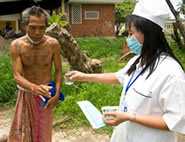
CDC established an office in Cambodia in 2002. CDC works closely with the Ministry of Health and other partners to build capacity for surveillance and outbreak investigation, to build quality lab systems, and to strengthen public health programs in HIV/AIDS, tuberculosis, flu, immunization, and injury prevention.
Download Overview Fact Sheet
 Cambodia at a Glance
Cambodia at a Glance
Population: 14,406,000
Per capita income: $2,360
Life expectancy at birth women/men: 64/61 yrs
Under 5 mortality: 45/1000 live births
Source: Population Reference Bureau, 2013
 Top 10 Causes of Death
Top 10 Causes of Death
Source: GBD Compare 2010, 2010
- Lower-Respiratory Infection 5%
- Ischemic Heart Disease 5%
- Lower-Respiratory Infection 5%
- Stroke 4%
- Malaria 3%
- HIV 3%
- Lower Back Pain 3%
- Pre-term Birth Complications 3%
- Chronic Obstructive Pulmonary disaese 3%
- Major Depressive Disorder 2%
What CDC Is Doing
- Page last reviewed: August 13, 2014
- Page last updated: August 13, 2014
- Content source:
Global Health
Notice: Linking to a non-federal site does not constitute an endorsement by HHS, CDC or any of its employees of the sponsors or the information and products presented on the site.



 ShareCompartir
ShareCompartir

 CDC provides technical support to the national TB prevalence survey, a critical element for evaluating disease burden and program impact. CDC is helping to improve laboratory diagnosis of TB by introducing liquid culture and other techniques. The agency worked with partners in Cambodia, Vietnam, and Thailand to conduct clinical research on TB screening and diagnosis among people living with HIV. Once an improved, evidence-based approach was identified, CDC worked with the Cambodian MoH to revise guidelines and to implement the activities that will lead to better diagnosis and earlier treatment to prevent mortality related to TB.
CDC provides technical support to the national TB prevalence survey, a critical element for evaluating disease burden and program impact. CDC is helping to improve laboratory diagnosis of TB by introducing liquid culture and other techniques. The agency worked with partners in Cambodia, Vietnam, and Thailand to conduct clinical research on TB screening and diagnosis among people living with HIV. Once an improved, evidence-based approach was identified, CDC worked with the Cambodian MoH to revise guidelines and to implement the activities that will lead to better diagnosis and earlier treatment to prevent mortality related to TB. CDC provides guidance to the MoH and WHO to develop strategies and to provide ongoing guidance for monitoring Cambodia’s progress towards achieving the WHO Western Pacific Region’s twin goals of measles elimination and hepatitis B control. CDC also provides technical assistance in developing strategies to maintain the polio-free status of the region, including Cambodia. Although Cambodia was certified as polio free in 2000, low coverage with polio vaccine and substandard acute flaccid paralysis surveillance has resulted in the country being at high risk for wild polio importation.
CDC provides guidance to the MoH and WHO to develop strategies and to provide ongoing guidance for monitoring Cambodia’s progress towards achieving the WHO Western Pacific Region’s twin goals of measles elimination and hepatitis B control. CDC also provides technical assistance in developing strategies to maintain the polio-free status of the region, including Cambodia. Although Cambodia was certified as polio free in 2000, low coverage with polio vaccine and substandard acute flaccid paralysis surveillance has resulted in the country being at high risk for wild polio importation. CDC is working with the Asia Injury Prevention Foundation to reduce the number of fatalities, serious brain traumas, and injuries due to road traffic crashes in Cambodia. CDC supports surveillance activities and surveys to assess knowledge, attitudes and actual helmet use to inform programmatic activities. CDC is also supporting the implementation and analysis of a survey to measure violence against children in Cambodia.
CDC is working with the Asia Injury Prevention Foundation to reduce the number of fatalities, serious brain traumas, and injuries due to road traffic crashes in Cambodia. CDC supports surveillance activities and surveys to assess knowledge, attitudes and actual helmet use to inform programmatic activities. CDC is also supporting the implementation and analysis of a survey to measure violence against children in Cambodia.